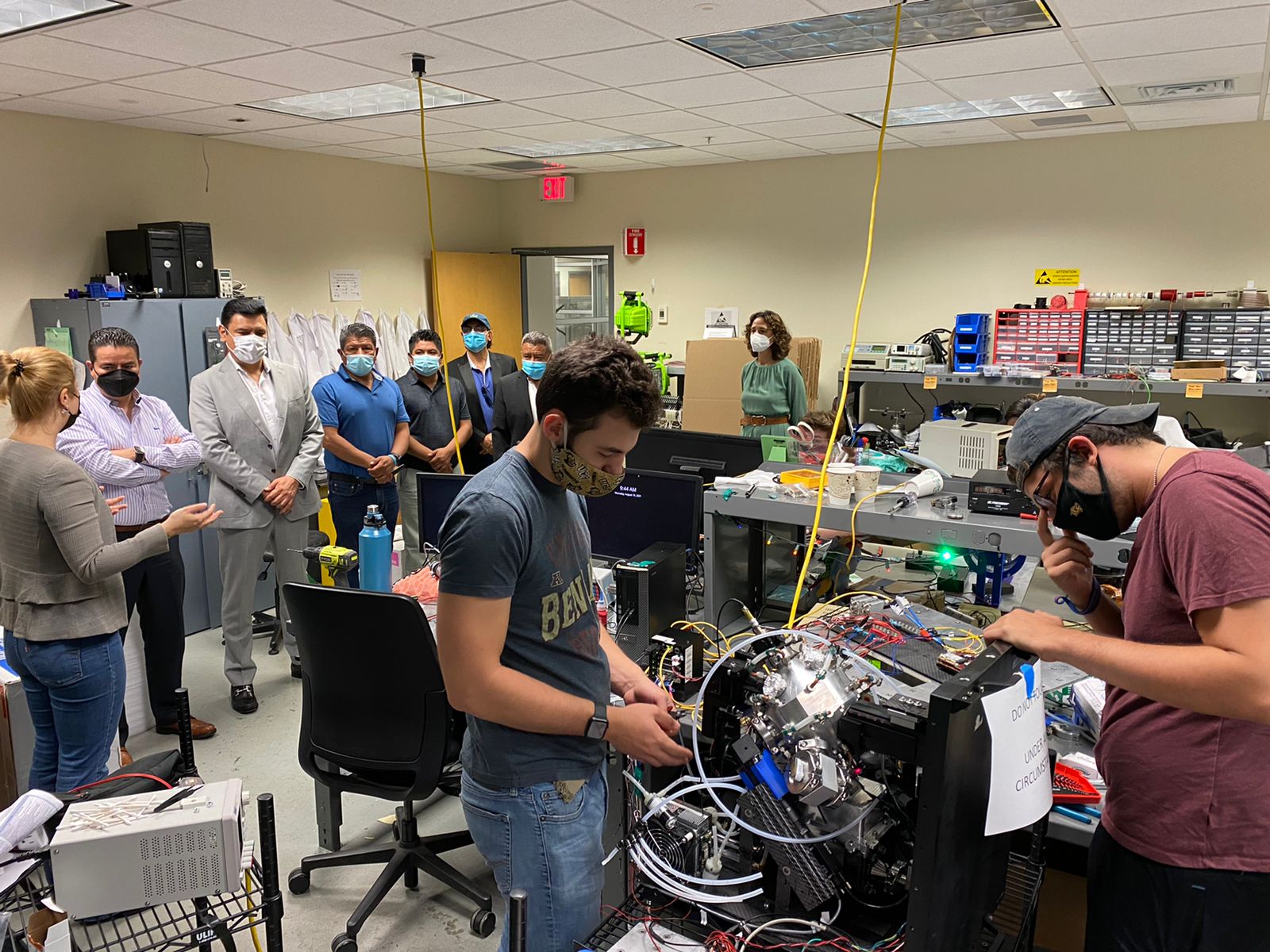
Student Design
About Student Design
FSI Student Design combines NASA, Industry, and the Florida Space Institute’s (FSI) technical needs with university program requirements to create Senior Design and Capstone projects suitable for Single and Multi-Discipline Engineering Teams. The ideal project:
- Is suitable for student execution.
- Meets university academic requirements (for Senior Design).
- Is aligned with the FSI and NASA visions and needs.
- Meets mentor needs.
- Provides the students with a unique and relevant developmental experience.
Phase 1 of Florida Space Institute (FSI) Senior Design kicked off in Fall of 2018. Phase 1 focused on institutions close to FSI (Central Florida) to validate processes and allow for local visits if needed. This proved the concept with successful single and multi-discipline projects from the University of Central Florida, Embry Riddle Aeronautical University, the University of South Florida, and Florida Polytechnic University. It also allowed development and testing of appropriate support and control process to support expansion of both the number of projects as well as the number of Universities.
Phase 2 was delayed by COVID but is planned for a Fall 2021 / Spring 2022 kickoff. Phase 2 will double the number of Universities and Organizations involved by teaming with the Florida Space Grant Consortium (FSGC). It will also incorporate Design Competition elements to both expand the team base and enhance the Program.
Candidate new projects starts are included below under “Opportunities” and are open to any University. Financial support is available for teams that meet the criteria identified by sponsors. The Florida Space Grant Consortium criteria is located here. Teams may propose their own projects for inclusion with the form at the end of the Opportunities list and send it, or any questions, to Mike.Conroy@ucf.edu.
Focus Areas
FSI mentors and supports a wide range of Space related projects. Past projects have ranged from telescope systems, to analysis tools, to Lunar Business Plans, to Space Systems. The common thread is the link to the Institute’s mission. Proposals related to the Institutes mission are always welcome. In addition, there are several Focus Areas where successive projects and teams work together to meet Long Term Goals. Today there are 3 Focus Areas:
- Robotics and Rovers
- The Institute is working with NASA and others to develop a range of small rovers suitable for Education, Research and Operational tests. A key element is the NASA SwampWorks Mini-RASSOR, provided under a non-commercial license. This provides a modular, re-usable, mobility platform freeing Design Teams to add value with robotic elements (arms, effectors, sensors) beyond those providing basic mobility. The RE-RASSOR Cart has been released on the Florida Space Grant Web Site here. Details about FSI’s robotic initiative are available here.
- Gravity Machine
- The Gravity Machine project is developing a suite of low cost microgravity systems suitable for both Research and STEM Education. The systems are airborne drop vehicles with both active and passive systems that provide from 1.5 to 7 seconds of microgravity, as well as longer duration flights for simulated Lunar and Martian gravity. We are in Phase 2 of the project, with a microgravity target of 4 seconds, longer than most of the drop towers on Earth.
- Click to download the Gravity Machine Proof of Concept Report
- The Gravity Machine project is developing a suite of low cost microgravity systems suitable for both Research and STEM Education. The systems are airborne drop vehicles with both active and passive systems that provide from 1.5 to 7 seconds of microgravity, as well as longer duration flights for simulated Lunar and Martian gravity. We are in Phase 2 of the project, with a microgravity target of 4 seconds, longer than most of the drop towers on Earth.
- SISO Sim Smackdown
- The SEE SmackDown integrated international student teams to develop and simulate a human lunar colony. It is a partnership between NASA, the Institute, SISO, Universities and Industry; with SIGSIM joining us for the 2022 event. The tools have their roots in NASA’s simulation labs and leverage modern commercial tools. NASA and Industry provide tools, standards and expertise for the teams. The SmackDown Colony projects NASA’s Artemis Plan 25 years into the future.
- Click to download the SpaceFOM Report
- The SEE SmackDown integrated international student teams to develop and simulate a human lunar colony. It is a partnership between NASA, the Institute, SISO, Universities and Industry; with SIGSIM joining us for the 2022 event. The tools have their roots in NASA’s simulation labs and leverage modern commercial tools. NASA and Industry provide tools, standards and expertise for the teams. The SmackDown Colony projects NASA’s Artemis Plan 25 years into the future.
Project Types
Senior Design, Capstone, and Thesis are all types of FSI Student Design Projects. The terms “Senior Design” and “Capstone” are used relatively interchangeably across Engineering schools. The term “Capstone” is used outside engineering to indicate graduate level projects, typically referring to individual work under the supervision of an advisor. For FSI, the terms are synonymous and refer to projects associated with the student’s senior year. The Thesis Project is similar, typically associated with a single student, and often associated with an advanced degree (usually Master’s). In all cases, the projects are scoped and staffed with the associated faculty to ensure satisfaction of academic requirements.
Some projects are closely coupled to NASA needs and related to NASA’s SSERVI (Solar System Exploration Research Virtual Institute). In some cases, NASA defines these teams as NASA SSERVI Collaborators. These are best described as internships with NASAS mentors. Eligibility requirements for these projects are included in the project package.
Design Goals
The common goals across all of these projects are:
- Individual Student development in Engineering
- Creation of new capabilities and systems supporting Space Exploration and Research
- Creation of foundational elements to enhance Student development
- Creation of new capabilities for STEM and STEAM education, enabling the next generation of Engineering Students
